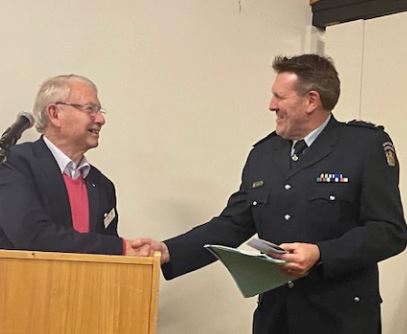A Journey from Bars to Bars

Euan welcomes Grant to the Podium
We were treated to Grant’s interesting journey from a sea faring background to becoming the Assistant Director of Rolleston Prisons.
Grant was born in Lyttelton and ran away to sea as a fifteen year old. This involved spending many years overseas in the Navy where he initially completed an electronics apprenticeship and later became an officer.
“I also spent a summer in the Antarctica which was like being on another planet” he continued. He also got to visit a range of other interesting places including Bosnia.
Like Rotary, Grant describes his life as serving others which gave him a great education and, at age 35, he left the Navy with a pension.
After undergoing some more training he ended up as a project director responsible for a billion dollar contract building an assault ship in Spain which included completing a targeted MBA degree. “This was a great project and opened a lot of other doors for me” he smiled.
On returning to Christchurch after the quakes, Grant decided to help out with the recovery for three years. He was then contacted by the Navy and asked if he would like to come into the Limited Service Volunteer (LSV), a youth development programme that offered six week military style experience.
This involved teaching youth key values that they could take with them into the labour market.
After three years he was beginning to wonder what might be next. He looked into social development options and came across a Prison Director role at Christchurch Men’s and Women’s Prisons which he successfully applied for.
“My role is to support my team of 75 staff in helping those locked up to reintegrate into society” he explained. The variety of projects and programmes offered include building houses from scratch, offering a variety of education programmes and case managing individuals to assist with their successful integration back into society.
“We aim to help fix what is broken and help them move on” he continued. This involves helping them understand what needs done and teaching skills they can develop to reduce the chance of reoffending which includes reducing violence and avoiding drugs. Each person also gets a personalised individual development plan targeting their specific needs.
“This includes planning a gradual release including support with basic tasks such as opening a bank account as they are often quite stressed and nervous doing these things” Grant explained.
The prisons are also now offering a special project that focusses on a Maori cultural approach as a sizeable proportion of inmates are Maori. This includes learning about and reconnecting with their background.
Grant concluded by noting that the role of volunteers in the prisons is paramount in helping keep prisoners functioning and busy.
Euan thanked Grant for his insights into his background and the valuable work he does in his current role.